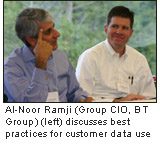
|
|
|
 |
|
 |
Using and Stewarding Customer Data Roundtable on Digital Strategies October 4, 2007 - Hanover, NH hosted by the Tuck School of Business CIOs and other senior execs from 3M, Bechtel, BMW Group, BT Group, Cisco, Eaton, Hilti, and Johnson & Johnson were joined by academics from Tuck and the University of Cologne for this roundtable. |
||
|
Press Release
Agenda
List of Participants
Discussion Guide
Overview Article
|
|||||
Yet security and privacy issues are clearly more poignant than ever. Data of all types is increasingly available and customers are increasingly aware that companies gather data to use to compete for more business.
In this roundtable, we looked at strategies for meeting and exceeding customer expectations with data use. The participants' experiences and views yielded the following insights (see the Overview Article for a complete summary):
- While high quality transactional and behavioral data is more available than ever, companies are still trying to figure out what to do with it, and how to build data management competencies.
- Competitors can replicate your data over time, but not necessarily your ability to consistently translate it into better products and customer value. To gain sustainable strategic advantage from customer data, enterprises should make it a C-level priority and core organizational competency.
- Data quality hinges on the people who collect and use the data, and motivating them to do it right is a key leverage point.
- Making the leap from prediction to insight is a milestone on the customer data learning curve.
- Well-designed governance models are crucial to making sure customer data is shared effectively and used for its intended purpose.
- Privacy and security are important considerations in a data management strategy, but not an overriding limitation as long as you put the customerís interests first.
- Companies should view leveraging data as a people issue. Engaging people in data-driven processes, continuing to reinforce the value of data through management systems, and hiring people with an analytic mindset, are key success factors.
| Other center programs on Consumer Data | |
| Social Shopping - A center research study on new social shopping applications | |
| The CIO as Strategic Business Partner: Leading Change and Driving Results - An Executive Workshop | |
| Managing Consumer Data - A Tech@Tuck event | |